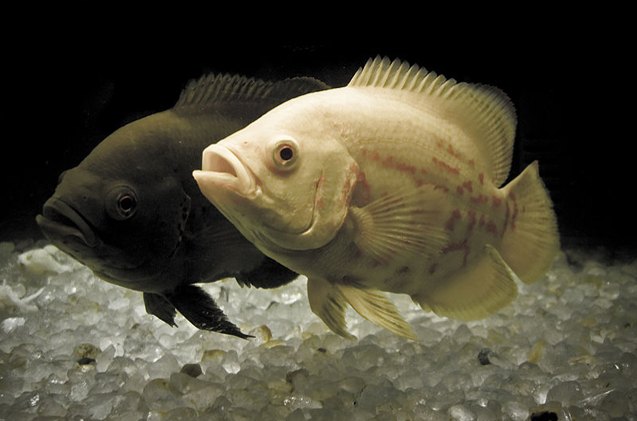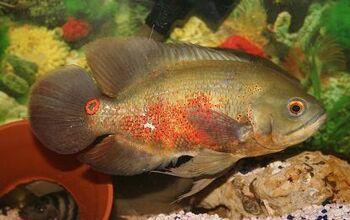Some fish and aquarium plants don’t go together. If you’re thinking of adding Oscars to your planted tank, keep these important facts in mind.
Many aquarium hobbyists love Oscars because they are unique among freshwater aquarium fish species. Oscars are a type of cichlid and they grow large – up to 18 inches long. Not only are Oscars beautiful, but they have a lot of personality; many aquarium hobbyists describe them as dogs in the body of a fish because they beg for food and seek attention from their owners. Although Oscars make wonderful pets, they do present some inherent challenges. The biggest obstacle with Oscars is keeping them from destroying your live plants.
Oscars are very particular about their living spaces, and their finicky preferences can change over time. These fish are highly moody and have been known to throw a tantrum from time to time when they aren’t happy with their surroundings. You may find that you place a new plant only to have them instantly go after it, rooting it up and trying to move it from your desired location. At the same time, another new plant could be placed and ignored for weeks, making it seem as though they are comfortable with it. However, weeks down the road, they may change their mind. Never take your fish’s approval for granted!
Related: Top 8 Best Aquarium Plants for Beginners
Oscars and Live Plants
When you think about Oscars and the challenges they present for the freshwater aquarium hobbyist, there are several factors to consider. The main obstacle, of course, is related to the size of the species. These fish have the capacity to grow up to 18 inches long, though they tend to top out around 10 inches in captivity. The large size of this species necessitates a large aquarium – at least 55 gallons for a single Oscar, or 100 gallons for a pair. In addition to the tank size, you also need to think about tank requirements like temperature and water chemistry. Oscars prefer warm waters between 77 and 80 degrees with a pH between 6.0 and 7.5.
Cultivating the proper tank conditions for Oscars isn’t difficult, but you will come across some challenges if you try to keep live plants in the tank with your Oscars. Oscars don’t usually eat live plants – the challenge Oscars present is that they have a tendency to root through the substrate in their aquarium which can cause damage to the plant roots. Oscars tend to “rearrange” their tanks a lot, pushing tank decorations around and digging through substrate. Many aquarium plants are unable to tolerate this kind of treatment and they are likely to die if their roots are damaged.
Related: Let’s Talk About Amazon Sword Plants
If you do plan to keep live plants in your Oscar tank you need to be intentional about where you place them. If you have a sizable tank (about 150 gallons or more), your Oscar might leave part of the tank alone. Another option is to protect your live plants by surrounding them with large tank decorations that your Oscar will have a difficult time moving. For example, you could place your live plants in the corners of the tank and then protect the roots with large rocks or other decorations. This is not a fool-proof plan, but it may help you to keep your plants around a little longer.
You can also tie the roots of your plant to a large rock or another weighted item. This will help to keep your plant firmly in place even if your fish decides to root through all the substrate around it, giving you time to address the damage before it has a lasting impact on the health of your plant.
Oscar Compatible Plants
Some live plants that are better suited to surviving the rooting activities of your Oscars. These plants are often hardier, allowing them to stand up to the potential abuse that they will face. They may also be known for having larger or more structured root systems, making it difficult for the Oscars to uproot the plant.
Pay attention to the optimal water conditions for the plants that you are considering. Choosing live plants that prefer conditions that are optimal for your fish will make the care of your tank far easier. That way, you are not requiring either the plants or the fish to sacrifice what they want most.
Floating plants are also highly favorable for surviving in an aquarium with an Oscar. They aren’t rooted in the substrate, meaning that they aren’t then uprooted from your Oscar’s digging and rooting habits. However, if you are looking for a standard grounded plant appearance, this may not be the solution that you’re looking for. It is all about your personal preferences and the aquarium appearance that you are working to create.
Java Fern
A popular, low-cost, and extremely hardy aquarium plant, java ferns have been known to survive in surprisingly difficult conditions. If your Oscar does uproot your plant, it will continue to live giving you time to notice and address it. This is due to the fact that the fern doesn’t draw its nutrients through its roots. It can even be left floating in the tank and continue to thrive.
Java Moss
Another aquarium plant that can be left to float in the tank versus needing to be securely rooted in a tank. It can also be used as a carpet material across the bottom of your aquarium or be tied to any ornament. If you are securing it to an ornament in the tank, choose something heavy and difficult for your Oscar to move about to create a more stable and secure environment.
Banana Plant
Many Oscar owners have had success keeping a banana plant alive in their aquarium due to how hardy this beginner-friendly plant has proven to be. It is a relatively short plant that can easily be tucked in alongside an aquarium ornament to keep the roots protected.
Floating Fern
Also known as Floating Watermoss, Water Butterfly Moss, and Floating Moss, this floating plant is a great addition to your Oscar’s tank. Not only does it float at the top of your tank, but it’s also an extremely hardy plant that can withstand a little abuse from these mischievous fish. It also provides a cover that your Oscar may enjoy hiding beneath throughout the day.
Anubias Barteri
A highly resilient aquarium plant, Anubias Barteri is often a favorite of beginner aquarium owners as they can take a significant amount of abuse. However, this ability to withstand whatever is thrown their way is also a great feature when choosing live plants that can exist in the same space as an Oscar. This bright green plant has a strong structure and can be purchased in several different sizes, depending on the variety, allowing it to be used for the foreground or background of your aquarium design.
Artificial Plants
If you’re reading through these plant options, you may have already set your mind on the idea of incorporating live plants into your aquarium. However, plastic, or artificial plants may offer the perfect balance between function and aesthetic. There are many great artificial options on the market that look almost real to the untrained eye. However, if your fish starts to dig around in the substrate and unroots the plant, it won’t cause any problems. By going with artificial plants in place of live plants, you can also branch out into plants that wouldn’t otherwise survive the abuse of an Oscar. The options are endless!
Best Tank Decorations for Oscars
Though Oscars and live plants do not tend to do well together, there are certain decorations that are recommended for an Oscar tank. Large, flat rocks and rock caves can be great additions to the Oscar tank because your fish will have a hard time moving such large objects. Slate is a particularly good choice for the Oscar tank because it is flat – this will provide your Oscars with a surface on which to spawn, if breeding is an interest of yours, while also providing you with a larger and heavy layer of protection on the surface of the aquarium. Placing slate at the base of your aquarium plants will prevent your Oscar from having access to the roots found in the substrate below.
Large pieces of driftwood can also be added to the tank to give it a natural appearance. When using large tank decorations, just be careful to position them so that they will not injure your fish if they fall over. You should also avoid sharp points or rough edges that could hurt your Oscars if they try to push them around. Keep in mind that Oscar’s require significant room to move around. Too many large aquarium ornaments can minimize the space available for your fish. If you are invested in the idea of including several large decorations, consider upgrading the size of your fish tank to compensate for it. Pay attention to the parts of your Oscar’s tank where he prefers to dig and root as well as the parts that he tends to avoid. This will help identify the best location for decorations.
It is best to stick with natural-looking decorations. Brightly colored aquarium supplies can be jarring or unsettling for your Oscar, triggering one of their temper tantrums. While they may not be upset directly by the plants in your aquarium, or even focusing on their existence. However, as your fish tries to get rid of the offending decorations, your plants may get caught up in the crossfire. The best results will come from choosing decorations that best represent the natural habitat of your Oscar.
Keeping Oscars is challenging but it can be rewarding for the aquarium hobbyist as well. Because these fish can be such a challenge, it is even more important that you do your research before setting up your tank to be sure that everything will go well.


























